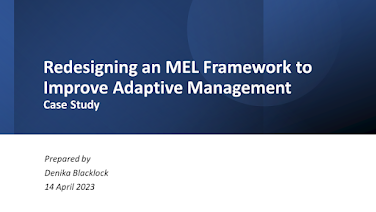As the COVID-19 economic recovery progresses, and the world works towards resuming some sort of normalcy in our daily lives (and I get back to writing on this blog!), more emphasis needs to be placed on reflecting on what happened during COVID-19. Not just the stress of online schooling (oh boy), the working from home (video off as I was usually still in my pjs), and the loss of time with friends and family (I haven’t seen my family in 2.5 years… soon to be rectified!). No, what we need to focus on is what we have learned about our work – no matter what sector or what type of work you undertake, we all learned that business as usual (BAU) practices simply could not cope with the shock to the economic and social systems we live in. In my line of work, and in my perspective, one of the biggest questions that has emerged is whether the development community is capable of truly improving the resilience of communities – whether to climate, disaster, economic or health shocks. I recently p...

